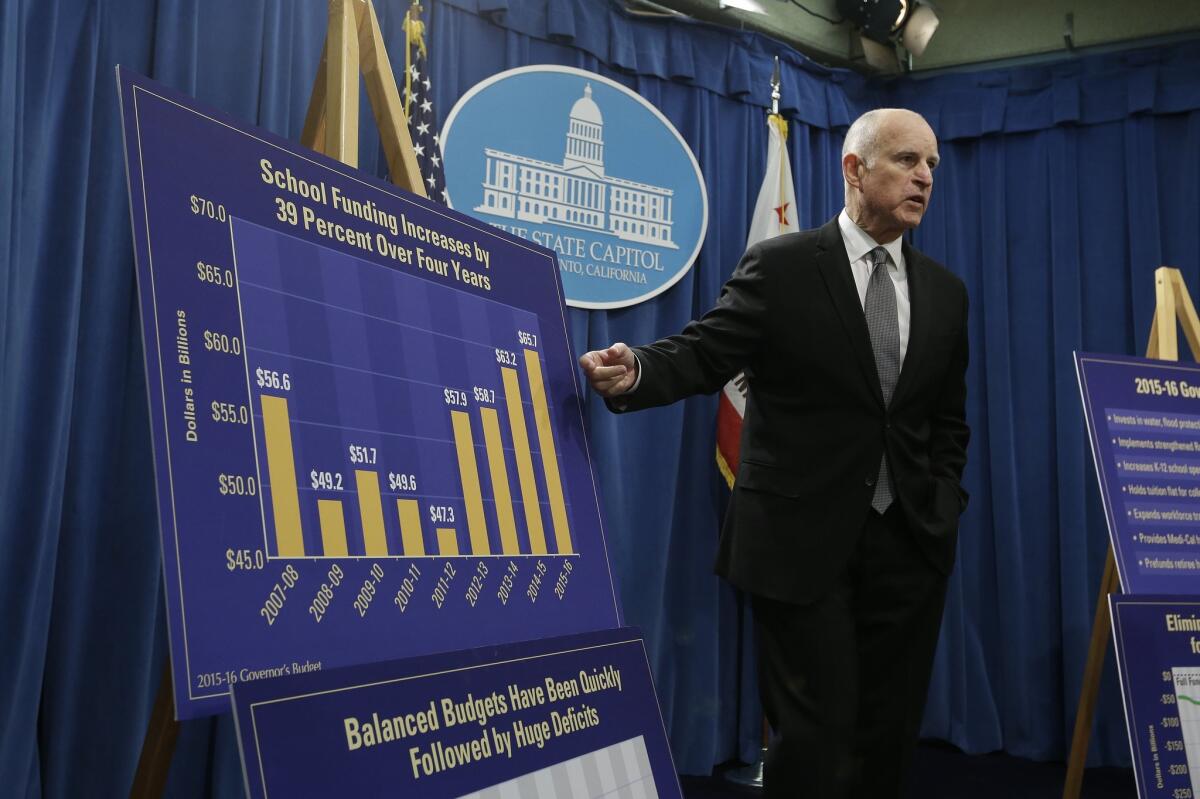Gov. Jerry Brown wants tax credit for poor in California’s budget

Gov. Jerry Brown, pictured in January discussing state finances in the Capitol, will propose a new earned income tax credit for California on Thursday.
- Share via
Reporting from Sacramento — Gov. Jerry Brown, who has faced criticism for not doing more to combat persistent poverty in California, will include a new tax credit for the state’s poorest families in his revised budget plan Thursday.
The change would keep more money in the pockets of 825,000 families and reduce the state’s revenue by $380 million, according to administration estimates.
The proposal, known as an earned income tax credit, would help the state’s poorest residents on a sliding scale, based on their wages and how many children they have. No one earning more than $13,870 a year would qualify.
The average qualifying household would gain $460 a year. The maximum credit, for families with three or more children, would be $2,653.
“In a time when the economy is doing well, we have a lot of people who aren’t doing well,” said an administration official, who requested anonymity because most details of the budget are being kept under wraps until Brown announces them. “We’ve heard a lot from the Legislature ... and we know this is important.”
By proposing the tax credit, which would be available for the first time next year, Brown is taking a more active approach to poverty in California. The move aligns him with fellow Democrats in the Assembly, who have made such a credit one of their priorities for budget negotiations this year.
“The governor decided he wanted to take some kind of action in the budget, something that addressed this issue of poverty,” the administration official said. “He decided this was the most effective way.”
The federal government allows an earned income tax credit that applies to people earning up to about $50,000, depending on how many children they have. In 2013, it provided 3.1 million households with an average of $2,373 each, for a total of $7.3 billion, according to Internal Revenue Service figures.
A 2013 study from the Public Policy Institute of California said the federal credit was one of the most effective tools for reducing poverty in the state.
However, unlike 25 other states and Washington, D.C., California has not supplemented the federal credit with one of its own, to the chagrin of some Democrats and advocates for the poor.
Assemblyman Mark Stone (D-Scotts Valley) has been pushing legislation to create a California credit, saying the state, which gives tax breaks to the film industry and other businesses, can afford it.
“An earned income tax credit is the same kind of investment in our economy,” Stone said this year. “It’s just getting the money in the pockets much further down the economic strata who need it the most.”
It’s been unclear whether Brown would agree to any other new proposals to aid the needy.
In January, when the governor released his initial budget proposal, he said there would not be much money available to increase spending. “It’s very tight,” he said at the time.
The state has since seen a flood of unexpected revenue; nonpartisan legislative analysts said the government’s coffers have taken in $3 billion more than anticipated this year. Most of that money, if not all, will be directed to public schools and community colleges under the state’s education funding law.
Additional funds will be deposited in the rainy-day fund that voters strengthened in November by passing a ballot measure that required the state to pay off debt and save money as a buffer against future economic downturns.
There is no guarantee that Brown’s new proposal will satisfy those who have faulted him for not doing more for the poor. It would provide less money for those with meager incomes than one option outlined by legislative analysts, which would cost $450 million.
Some cuts in government aid that were made during the recession have remained in place, and some members of Brown’s party have been frustrated by his refusal to open the purse strings more.
Lawmakers have called on him to increase state payments to doctors who treat poor patients, and others want more state spending on child care.
Laphonza Butler, state council president of the Service Employees International Union, said this week that reduced child-care aid has been a “barrier for working families to get into the workforce.”
Follow @chrismegerian for more updates from Sacramento.
More to Read
Sign up for Essential California
The most important California stories and recommendations in your inbox every morning.
You may occasionally receive promotional content from the Los Angeles Times.














